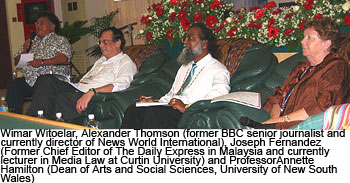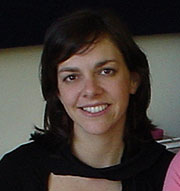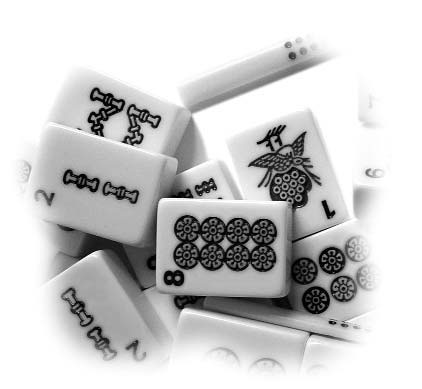Welcome to Asian Currents
Asian Currents aims to
connect Australia's academic experts on Asia with journalists, policy
makers, business people, artists and other educators. Please feel free
to forward this email to others you think would be interested in receiving
Asian Currents. Registration is free and open
to all by simply registering your email address at http://iceaps.anu.edu.au/asian-currents.html.
The e-bulletin normally appears in the third week of each month. |
From the President
| Welcome to the new-look Asian
Currents! This issue heralds the consolidation of the Asian Studies
Association of Australia’s cooperation with the International
Centre of Excellence in Asia Pacific Studies (http://iceaps.anu.edu.au),
which is lending generous support to Asian Currents.
Many thanks to the Director, John Fitzgerald, and his colleagues, Richard
Thomson and Valerie Shavgarova, for their enthusiasm about the ebulletin.
We look forward to working with ICEAPS, a Federal Government initiative
which aims to raise the profile of Asia-Pacific studies in Australia.
The Centre draws upon the Asia-Pacific expertise of key research and
teaching centres throughout Australia and in Asia, Europe and North
America, as well as several national professional networks. ICEAPS’s
goals make it an entirely compatible partner for the ASAA, whose main
aim is to promote the study of Asian languages, societies, cultures
in Australia. Together, through Asian Currents
and other initiatives, we will strive to increase Australians’
understanding of Asia and of the Asia expertise that already exists
around the country. |

Analysis
AUSTRALIA’S IMAGE IN ASIAby Dr Denise Woods, Project Officer Media-Asia Research Group, Curtin University of Technology Denise.Woods@exchange.curtin.edu.au |
|
Australia’s image in Asia was the topic of lively discussion
at the first conference of the Media-Asia Research Group (MARG) http://www.marg.humanities.curtin.edu.au Prominent Indonesian political commentator and talk show host Wimar Witoelar http://www.perspektif.net/wimar/ led the plenary session, ‘Seeing Australia Through Asian Eyes’, which discussed how Australia was portrayed in the region. The general view was that the media presented Australia as predominantly ‘white’ and Aboriginals as marginalised and very badly treated. This portrayal was linked to perceptions of the ‘mainstream’ treatment of other ‘non-white’ groups in Australian society. Asian delegates who had been to Australia pointed out they did not see much interaction between Anglo-Saxon Australians and Aborigines, reinforcing the impressions they got from the media that there was a social divide. Australians were seen to be arrogant, especially in dealing with regional neighbours whom they presumed to know and understand. Many commented that people-to-people contact did alter the impression that all Australians are racist or arrogant and that more such contact would further strengthen ties between Australia and the region. |
The Australian contingent’s response was defensive, especially about being labelled ‘arrogant’ or ‘racist’. An Australian delegate of Aboriginal descent pointed out that not all Aborigines look ‘black’, using herself as an example to indicate you cannot base judgments on ‘white’ and ‘black’ relationships on skin colour. Different perspectives between Australian and Asian delegates also emerged in terms of their approach to research. The Australians tend to be more focussed on exploring issues of identity and how the media represents its subjects. For example University of Queensland Professor Graeme Turner’s keynote address discussed the representation of Muslim youth on Australian television. He argued that the way a story is framed can influence the judgments of viewers, showing how misleading editing of a particular youth’s comments in a Today Tonight program gave the impression that Lebanese youth were unwilling to assimilate. This type of media coverage made it difficult for Muslim-Australians to feel a sense of belonging. Asian research was more focused on a quantitative approach, such as surveys, for example on which regional television programs people were watching on Malaysian television. This data was used to find out what other countries people found culturally relevant. The scope of presentations at the conference was very
broad, all encompassing the theme of how television, radio, newspapers,
magazines, films, music and the Internet are shaping/re-shaping identities
in Asia. Papers examined subjects as diverse as the use of the Internet
to treat breast cancer, to the role of web radio in Vietnam, to new
challenges to media law presented by the convergence of new and traditional
media. Papers will be available on the website by end of March 2006: |
http://www.amic.org.sg/
Asia's premier media research, publication and documentation centre |

AFTER THE TSUNAMI: harnessing Australian expertise for recoveryBy Bill Mackey, Communications Director, Australian Academy of Technological Sciences and Engineering (ATSE) BillM@atse.org.au |
|
By taking the lead in establishing a high-level Indian Ocean governance forum similar to the one that already operates for the Asia-Pacific region, Australia could play a key role in helping Indian Ocean-rim countries prepare for and mitigate disasters. This was one of seven key recommendations from a 2005
workshop, organised by the National Academies Forum (NAF), the peak
body of Australia’s four academies: the Academy of the Social
Sciences in Australia (ASSA); the Australian Academy of Science (AAS);
the Australian Academy of Technological Sciences and Engineering (ATSE);
and the Australian Academy of the Humanities (AAH).
The workshop, organised in collaboration with the Department of Education, Science and Training (DEST) and with the support of the Australian Research Council (ARC), CSIRO, the International Centre of Excellence in Asia Pacific Studies (ICEAPS) and others, explored how Australian expertise in the sciences, humanities, technologies and engineering could be most effectively brought to bear, both on the current process of recovery and for the long term. |
The workshop’s seven specific recommendations were: 1. United strategic regional disaster management: For an effective approach to regional disaster management, Australia needs to establish multidisciplinary teams supported by a national framework, networks and a ‘common’ language—all underpinned by whole-of-government support. 2. National regional database: Australia should develop a database to support access to knowledge of both Australian and regional capacity. 3. Regional continuity of knowledge: Australia should make communication and education a key priority for all aspects of disaster preparedness, recovery and rehabilitation. In particular it should offer support for remote communities and effect evidence-based policy development. 4. High-level Indian Ocean governance: Australia should take a leading role in the establishment of a high-level Indian Ocean regional forum. 5. Culture of collaboration: Australian and regional research agencies should develop stronger links and partnership centres of excellence. This should include in-country training of professionals. 6. Strengthen Australia’s regional knowledge/skills base: Australia must consider regional cultural imperatives in all assistance and partnering activities. This means urgently strengthening our regional knowledge and skills bases — particularly in languages, history, cultural and religious studies, and political science — through government support of appropriate education, training and career structures. 7. Risk management as aid: Australia should consider risk management an essential component of a broader approach to aid and development to support sustainable regional futures. |

Profile
 This
month we profile Professor Adrian Vickers, Chair of Asian Studies at
the University of Wollongong http://www.capstrans.edu.au/people/staff/adrian-vickers.html
and convenor of this year’s Asian Studies Association of Australia
biennial conference. http://www.uow.edu.au/arts/conferences/asaa/
Professor Vickers is a specialist in Balinese history and culture and
is a regular commentator on Australian perceptions of Asia. This
month we profile Professor Adrian Vickers, Chair of Asian Studies at
the University of Wollongong http://www.capstrans.edu.au/people/staff/adrian-vickers.html
and convenor of this year’s Asian Studies Association of Australia
biennial conference. http://www.uow.edu.au/arts/conferences/asaa/
Professor Vickers is a specialist in Balinese history and culture and
is a regular commentator on Australian perceptions of Asia. |
||
|
Q. When did you become interested in studying Asia and why? A. I studied Indonesian at high school and in 1973 our school had an excursion to Java, Bali and Sumatra. I was hooked from then on and regret that so few schools nowadays can provide the same opportunities. There are only a handful of schools in NSW that offer Indonesian at all, and government travel advisories have virtually put an end to all school excursions to Indonesia. I was also able to continue learning not only Indonesian, but also regional languages at Sydney University, again another opportunity lost to students nowadays. My daughter, for example, would love to learn Javanese, but no-one in Sydney teaches it anymore--it’s only the language of 100 million people! Q. What are your current preoccupations? A. Organising the ASAA conference: I wake up in the early hours of the morning stressing out about getting everybody here and getting everything happening. In between I’m also reading up on what is being written in the way of new history in Indonesia. This is a flow-on from my recently published History of Modern Indonesia (Cambridge) http://www.cambridge.org/us/catalogue/catalogue.asp?isbn=0521542626. A third interest, and this isn’t just because it’s next Friday’s lecture, is the Mughal Empire, which I find really fascinating. |
Q. How do these fit into the contemporary scene? A. The new histories coming out in Indonesia are part
of the post-Suharto ‘freedom’ that has followed the lifting
of censorship. A lot of the news is good--Indonesia is asserting its
diversity, the Left now has a voice, and there is some really good new
research being done. My Mughal interest is probably an example of me getting on the India bandwagon, but I’ve always been fascinated by India, everything from Sivaite practices to Ravi Shastri’s batting. Q. What are your hopes for Asian studies in Australia? A. That we can capture the public agenda. It’s not just the national political leadership, but opinion makers in the arts and in most aspects of public life have a real blind spot for Asia. If people can be convinced that Asia is interesting and important then the funding will come back and the students will follow. But we, and here I particularly mean Indonesianists, have been very bad at telling people why they should be interested. We take it for granted that because we like the place, everybody else will. |
|
Researcher of the month
|
Jemma completed her thesis in 2002 and as a Fellow at the International Institute for Asian Studies in the Netherlands, she developed her wider thematic interest in the study of violence in Indonesia. The following year she accompanied her husband to Mumbai, India where she worked as a volunteer at a school for slum children and at a women's resource and advocacy centre. |
During this time her writings
were focused on the NGOs where she worked, the Indian film industry
and politics. Her PhD has been recently published as Anti-Chinese Violence
in Indonesia: 1996-1998 as part of the ASAA Southeast Asian Publication
Series. http://www.nus.edu.sg/npu/9971-69-332-1.html http://www.herb-feith-foundation.org/biography-project.html NB Monash University has recently advertised a new academic post, the 'Herb Feith Chair for the Study of Indonesia'. The closing date for applications is Friday, 31 March 2006 see http://adm.monash.edu/sss/employment/senior/
|

Website of the month
|
http://www.npcil.nic.in/aboutnpcil.asp In the wake of President Bush’s and Prime Minister Howard’s visits to India, which put the spotlight on India as a nuclear power, you may like to visit the website of the Nuclear Power Corporation of India Limited (NPCIL), a wholly owned enterprise of the Government of India under the administrative control of the Department of Atomic Energy (DAE). NPCIL operates fourteen nuclear power units at six locations and is implementing construction of eight ongoing nuclear power plants. (This website was located using the portal http://www.samachar.com/ ‘India made easy’.) |
Recent article of interest
 The Australian Strategic Policy Institute
http://www.aspi.org.au has just published a report by Chicago-based
economist David Hale, in which he gives his assessment of China’s
economic prospects and the impact this will have on the Asia-Pacific
region. Hale argues that with China now enjoying the fourth largest
nominal GDP in the world, its rise as a great economic power will be
one of the great geo-political challenges of the 21st century. A summary
of In the balance: China's unprecedented growth and implications for
the Asia-Pacific can be found at http://www.aspi.org.au/publications.cfm?pubID=87#
The Australian Strategic Policy Institute
http://www.aspi.org.au has just published a report by Chicago-based
economist David Hale, in which he gives his assessment of China’s
economic prospects and the impact this will have on the Asia-Pacific
region. Hale argues that with China now enjoying the fourth largest
nominal GDP in the world, its rise as a great economic power will be
one of the great geo-political challenges of the 21st century. A summary
of In the balance: China's unprecedented growth and implications for
the Asia-Pacific can be found at http://www.aspi.org.au/publications.cfm?pubID=87# |

Did you know?
|
The teams’ scores are not public, but ANU helped knock Tokyo University from its three-year reign as winners (Kyoto University won this year) and was rumoured to have won at least one of the rounds. ANU also won the Teamwork/Enthusiasm Trophy. For more see http://asianstudies.anu.edu.au/weblog/index.php?/archives/34-ANU-Team-Compet The Sumitomo Group sponsors the event. http://www.sumitomo.gr.jp/english/overview/inc4.html
|

Diary dates
Exhibitions and other events |
Conferences |
|
DILMAH TEA'S FOUNDER MERRILL J FERNANDO ON
BUSINESS ETHICS AND SOCIAL JUSTICE THE AVIAN FLU - IMPACT, SOLUTIONS & READINESS SYMBOLS & CEREMONIES INDONESIAN TEXTILE
TRADITIONS INTERNATIONAL ASIAN ANTIQUE AND ART FAIR 2006 ZEN MIND, ZEN BRUSH ASIA-PACIFIC TRIENNIAL OF CONTEMPORARY ART |
STRANGERS ON THE SHORE: A CONFERENCE ON EARLY
COASTAL CONTACTS WITH AUSTRALIA AUSTRALIANS AND NEW ZEALANDERS IN CHINA, 1800-1950 Sixth International Congress FOR THE STUDY
OF TRADITIONAL ASIAN MEDICINE 10TH ASIAN STUDIES CONFERENCE JAPAN (ASCJ) BORNEO IN THE NEW CENTURY ASIA-PACIFIC MISSIONARIES: AT HOME AND ABROAD THE AOTEAROA NEW ZEALAND INTERNATIONAL DEVELOPMENT
STUDIES NETWORK CONFERENCE |

You are welcome to advertise Asia-related events in this space. Send details to: fbeddie@ozemail.com.au
Feedback
What would be useful for you? Human interest stories, profiles of successful graduates of Asian studies, more news about what's on, moderated discussions on topical issues? Send your ideas to fbeddie@ozemail.com.au
About the ASAA
The Asian Studies Association of Australia (ASAA) promotes
the study of Asian languages, societies, cultures, and politics in Australia,
supports teaching and research in Asian studies and works towards an understanding
of Asia in the community at large. It publishes the Asia Studies Review journal
and holds a biennial conference.
The ASAA believes there is an urgent need to develop a strategy to preserve,
renew and extend Australian expertise about Asia. It has called on the government
to show national leadership in the promotion of Australia’s Asia knowledge
and skills. See Maximizing Australia's Asia Knowledge Repositioning and Renewal
of a National Asset http://coombs.anu.edu.au/SpecialProj/ASAA/
asia-knowledge-book-v70.pdf
Asian Currents is published by the Asian Studies Association of Australia (ASAA) http://coombs.anu.edu.au/ASAA/ thanks to a grant from the International Centre of Excellence for Asia Pacific Studies (ICEAPS) http://iceaps.anu.edu.au. It is edited by Francesca Beddie. The editorial board consists of Robert Cribb, ASAA President, John Fitzgerald, Director, ICEAPS, Keith Foulcher, ASAA Secretary, Mina Roces, ASAA Publications officer, Tamara Jacka, ASAA Council member.



 For
instance, in agreeing that the region needed a strategic plan for oceanic/earthquake
monitoring in the Indian Ocean, the workshop noted that Australia has
the only established earthquake warning system operating in the region.
In addition Australia could facilitate integrated coastal zone management
and support long-term ecological research to help Indian Ocean countries
understand their environments better.
For
instance, in agreeing that the region needed a strategic plan for oceanic/earthquake
monitoring in the Indian Ocean, the workshop noted that Australia has
the only established earthquake warning system operating in the region.
In addition Australia could facilitate integrated coastal zone management
and support long-term ecological research to help Indian Ocean countries
understand their environments better. For
high school students in regional Victoria in the early 1990s, Asian
studies featured little on the school curriculum. Jemma Purdey's interest
in Asia came via a combination of an exchange trip to Malaysia between
Years 11 and 12, and her active participation in human rights issues
with Amnesty International. The Dili Massacre in late 1991 piqued her
interest in Indonesia in particular. Jemma majored in Political Science
and Indonesian language for her BA (Hons) at the University of Melbourne
and also took a year out to travel and study in Indonesia.
For
high school students in regional Victoria in the early 1990s, Asian
studies featured little on the school curriculum. Jemma Purdey's interest
in Asia came via a combination of an exchange trip to Malaysia between
Years 11 and 12, and her active participation in human rights issues
with Amnesty International. The Dili Massacre in late 1991 piqued her
interest in Indonesia in particular. Jemma majored in Political Science
and Indonesian language for her BA (Hons) at the University of Melbourne
and also took a year out to travel and study in Indonesia. For the past twelve months as Writer-in-Residence at the Centre of Southeast
Asian Studies at Monash University, Jemma has been researching and writing
a biography of Herb Feith, Australia's first and greatly loved Indonesianist.
She has interviewed more than 100 of his friends, colleagues and former
students in Australia, Indonesia, East Timor and elsewhere. In early
2006 as a Harold White Fellow at the National Library of Australia,
Jemma has had privileged access to Herb's personal archive.
For the past twelve months as Writer-in-Residence at the Centre of Southeast
Asian Studies at Monash University, Jemma has been researching and writing
a biography of Herb Feith, Australia's first and greatly loved Indonesianist.
She has interviewed more than 100 of his friends, colleagues and former
students in Australia, Indonesia, East Timor and elsewhere. In early
2006 as a Harold White Fellow at the National Library of Australia,
Jemma has had privileged access to Herb's personal archive.  The
Australian National University ANU-ANJeL (Australian Network for Japanese
Law) team was the first non-Japanese university team to take part in
the 2005 Intercollegiate Negotiation Competition in Tokyo.
The competition covers two days of 3 ˝ hours of arbitrating and
another 3 ˝ hours of negotiating. The judges are professional
lawyers, arbitrators and judges. All arguments and the substantial written
submissions were conducted in Japanese.
The
Australian National University ANU-ANJeL (Australian Network for Japanese
Law) team was the first non-Japanese university team to take part in
the 2005 Intercollegiate Negotiation Competition in Tokyo.
The competition covers two days of 3 ˝ hours of arbitrating and
another 3 ˝ hours of negotiating. The judges are professional
lawyers, arbitrators and judges. All arguments and the substantial written
submissions were conducted in Japanese. THE
SUSSEX LIBRARY OF ASIAN STUDIES, to be launched in 2007, will
publish original scholarly work in various disciplines (including interdisciplinary
and transnational approaches) under the rubric of Asian studies -- particularly
economics, education, religion, history, politics, gender, comparative
studies with the West and regional studies in Asia. For further information
and proposal submissions, please contact the Series Editor, Dr. Mina
Roces, School of History, The University of New South Wales,
THE
SUSSEX LIBRARY OF ASIAN STUDIES, to be launched in 2007, will
publish original scholarly work in various disciplines (including interdisciplinary
and transnational approaches) under the rubric of Asian studies -- particularly
economics, education, religion, history, politics, gender, comparative
studies with the West and regional studies in Asia. For further information
and proposal submissions, please contact the Series Editor, Dr. Mina
Roces, School of History, The University of New South Wales,  BEAUTIFUL
MEMORIES - PAINTINGS BY WON SUNG
BEAUTIFUL
MEMORIES - PAINTINGS BY WON SUNG 16TH
BIENNIAL CONFERENCE OF THE ASIAN STUDIES ASSOCIATION OF AUSTRALIA (ASAA)
ON “ASIA RECONSTRUCTED” 26-29 June, 2006
16TH
BIENNIAL CONFERENCE OF THE ASIAN STUDIES ASSOCIATION OF AUSTRALIA (ASAA)
ON “ASIA RECONSTRUCTED” 26-29 June, 2006